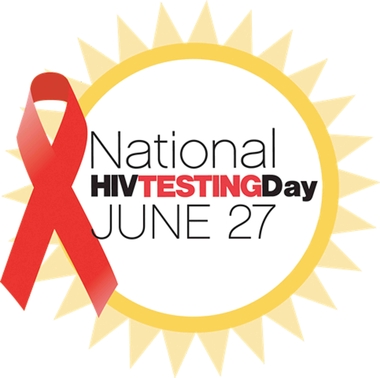Tomorrow, June 27, is National HIV Testing Day

National HIV Testing Day is a reminder to get the facts, get tested, and get involved to take care of yourself and your partners.
According to the Centers for Disease Control (CDC), an estimated 1.2 million people in the United States are living with HIV, and that number grows by almost 50,000 every year. One in eight people who have HIV don't know it. That means they aren't getting the medical care they need to stay healthy and avoid passing HIV to others.
CDC has found that more than 90 percent of new HIV infections in the United States could be prevented by testing and diagnosing people who have HIV and ensuring they receive prompt, ongoing care and treatment. Early linkage to and retention in HIV care is central to managing HIV and promoting health among all people living with HIV. HIV medicines can keep people with HIV healthy for many years, and greatly reduce the chance of transmitting HIV to their sex partners.
Get the Facts: Protecting yourself and others against HIV starts with knowledge. Knowing the facts about HIV will help you make informed decisions about sex, drug use, and other activities that may put you and your partners at risk for HIV.
- Learn the basics about HIV, how to prevent HIV transmission, and the steps you can take to protect yourself and others.
- Talk about what you learn with your friends and other people who are important to you.
- Empower even more people via social media. Share your new knowledge with your friends online.
Find more information about HIV testing, and who should be tested, on CDC's HIV Testing Basics web page at www.cdc.gov/hiv/basics.
Get Tested: The only way to know if you are infected with HIV is to get tested.
CDC recommends that everyone between the ages of 13 and 64 get tested for HIV at least once as part of routine health care, and that people with certain risk factors get tested more often.
People with more than one sex partner, people with sexually transmitted diseases (STDs), and people who inject drugs are likely to be at high risk and should get tested at least once a year. Sexually active gay and bisexual men may benefit from even more frequent testing, depending on their risk. To protect your own health, you should also get tested if you have been sexually assaulted.
If you are pregnant or planning to become pregnant, CDC recommends HIV testing with each pregnancy, both for your own benefit and to reduce the risk of transmitting HIV to your baby.
Knowing your HIV status gives you the power to control your health and your future. And getting tested has never been easier. You can ask your health care provider to test you for HIV. Many medical clinics, substance abuse programs, community health centers, and hospitals offer HIV testing. Testing is often free of charge.
For basic HIV testing Q&As visit www.cdc.gov/hiv/basics/testing.
The Gayly – June 26, 2016 @ 12:30 p.m.





